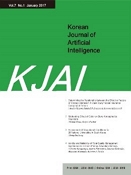 E-ISSN : 2508-7894
E-ISSN : 2508-7894
Vol.12 No.2
Abstract
In this paper, we compare three models (logistic regression, Random Forest, and XGBoost) for predicting stroke occurrence using data from the Korea National Health and Nutrition Examination Survey (KNHANES). We evaluated these models using various metrics, focusing mainly on recall and F1 score to assess their performance. Initially, the logistic regression model showed a satisfactory recall score among the three models; however, it was excluded from further consideration because it did not meet the F1 score threshold, which was set at a minimum of 0.5. The F1 score is crucial as it considers both precision and recall, providing a balanced measure of a model's accuracy. Among the models that met the criteria, XGBoost showed the highest recall rate and showed excellent performance in stroke prediction. In particular, XGBoost shows strong performance not only in recall, but also in F1 score and AUC, so it should be considered the optimal algorithm for predicting stroke occurrence. This study determines that the performance of XGBoost is optimal in the field of stroke prediction
Abstract
In this study, we delve into the effects of personalization algorithms on the creation of "filter bubbles," which can isolate individuals intellectually by reinforcing their pre-existing biases, particularly through personalized Google searches. By setting up accounts with distinct ideological learnings—progressive and conservative—and employing deep neural networks to simulate user interactions, we quantitatively confirmed the existence of filter bubbles. Our investigation extends to the deployment of an LSTM model designed to assess political orientation in text, enabling us to bias accounts deliberately and monitor their increasing ideological inclinations. We observed politically biased search results appearing over time in searches through biased accounts. Additionally, the political bias of the accounts continued to increase. These results provide numerical evidence for the existence of filter bubbles and demonstrate that these bubbles exert a greater influence on search results over time. Moreover, we explored potential solutions to mitigate the influence of filter bubbles, proposing methods to promote a more diverse and inclusive information ecosystem. Our findings underscore the significance of filter bubbles in shaping users' access to information and highlight the urgency of addressing this issue to prevent further political polarization and media habit entrenchment. Through this research, we contribute to a broader understanding of the challenges posed by personalized digital environments and offer insights into strategies that can help alleviate the risks of intellectual isolation caused by filter bubbles
Abstract
Various methods have been developed to predict the flight path of an air-launched weapon to intercept a fast-moving target in the air. However, it is also getting more challenging to predict the optimal firing zone and provide it to a pilot in real-time during engagements for advanced weapons having new complicated guidance and thrust control. In this study, a method is proposed to develop an optimized weapon engagement zone by the SCG (Scaled Conjugate Gradient) algorithm to achieve both accurate and fast estimates and provide an optimized launch display to a pilot during combat engagement. SCG algorithm is fully automated, includes no critical user-dependent parameters, and avoids an exhaustive search used repeatedly to determine the appropriate stage and size of machine learning. Compared with real data, this study showed that the development of a machine learning-based weapon aiming algorithm can provide proper output for optimum weapon launch zones that can be used for operational fighters. This study also established a process to develop one of the critical aircraft-weapon integration software, which can be commonly used for aircraft integration of air-launched weapons.
Abstract
This study examines the relationship between customer satisfaction and management response in the hotel industry amid the COVID-19 pandemic. By applying regression analysis and topic modeling to consumer reviews on online platforms, we assess how consumer perceptions and management behaviors have shifted since the onset of the pandemic. The findings reveal a significant decline in customer satisfaction linked to COVID-19. Significantly, while the pandemic has reduced overall customer satisfaction levels, high response rates and high review-response content similarity mitigate the impact of the crises. These results highlight the critical need for hotel managers to continuously monitor online reviews and adapt their engagement strategies to maintain and enhance customer satisfaction during ongoing and future crises. This research not only corroborates existing theories on customer satisfaction but also exposes novel dynamics introduced by the pandemic, offering new insights for effective customer relationship management in turbulent times.













